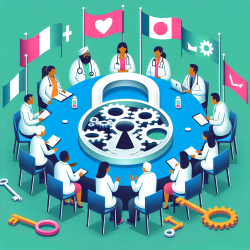United for Change: Harnessing the Power of Collaboration in Crisis
The COVID-19 pandemic has been a catalyst for unprecedented change across various sectors, including education and healthcare. The article "Coming Together: How Medical Students, Academic Administrators, and Hospital Administrators Approached Student Volunteering During the COVID-19 Pandemic" provides a compelling narrative of how collaboration can lead to innovative solutions during times of crisis. As practitioners in the field of speech language pathology and online therapy, we can draw valuable lessons from these collaborative efforts to enhance our own practices.
Learning from the Past: A Data-Driven Approach
Data-driven decision-making is at the heart of effective practice. The study highlights how medical students, academic administrators, and hospital administrators at Rutgers New Jersey Medical School worked together to create the Student COVID Team. This initiative was not only a response to immediate needs but also a demonstration of how data and evidence can guide effective collaboration.
For practitioners in speech language pathology, the importance of using data to inform decisions cannot be overstated. By analyzing the outcomes of collaborative efforts, we can identify strategies that improve service delivery and client outcomes. For instance, the use of teletherapy during the pandemic has shown promising results in maintaining continuity of care. By examining data on client engagement and progress, we can refine our approaches to online therapy services.
Fostering Collaboration in Online Therapy
The success of the Student COVID Team underscores the importance of collaboration among stakeholders. In the context of online therapy, collaboration can take many forms, such as partnerships between schools, therapists, and families. By working together, we can create a supportive environment that enhances the therapeutic process.
Consider the following strategies to foster collaboration in your practice:
- Regular Communication: Establish regular communication channels with all stakeholders to ensure everyone is informed and aligned with the therapy goals.
- Shared Goals: Work with families and schools to set shared goals that are meaningful and achievable for the child.
- Feedback Mechanisms: Implement feedback mechanisms to gather insights from all parties involved and make necessary adjustments to the therapy plan.
Encouraging Further Research
The article serves as a reminder of the importance of ongoing research and innovation. As practitioners, we should be encouraged to conduct our own research to explore new methods and technologies in online therapy. By staying informed about the latest developments, we can continue to provide high-quality services that meet the evolving needs of our clients.
Moreover, engaging in research collaborations with academic institutions can provide valuable insights and resources. These partnerships can lead to the development of evidence-based practices that enhance the effectiveness of online therapy services.
Conclusion
The collaborative efforts during the COVID-19 pandemic offer a powerful example of how working together can lead to innovative solutions. As speech language pathologists and online therapy providers, we can apply these lessons to improve our practices and create positive outcomes for children. By embracing collaboration, data-driven decisions, and ongoing research, we can continue to adapt and thrive in a rapidly changing world.
To read the original research paper, please follow this link: Coming Together: How Medical Students, Academic Administrators, and Hospital Administrators Approached Student Volunteering During the COVID-19 Pandemic.










